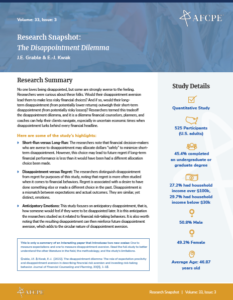The papers below are brief snapshots of fascinating personal finance research.
Read the full studies to better understand the other literature in the field, the methodology, and the limitations.
The Disappointment Dilemma
Volume 33, Issue 3
J.E. Grable & E.-J. Kwak
No one loves being disappointed, but some are strongly averse to the feeling. Researchers were curious about these folks. Would their disappointment aversion lead them to make less risky financial choices? And if so, would their long-term disappointment (from potentially lower returns) outweigh their short-term disappointment (from potentially risky losses)? Researchers termed this tradeoff the disappointment dilemma, and it is a dilemma financial counselors, planners, and coaches can help their clients navigate, especially in uncertain economic times when disappointment lurks behind every financial headline
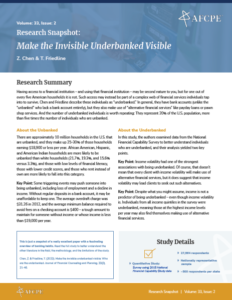
Make the Invisible Underbanked Visible
Volume 33, Issue 2
Z. Chen & T. Friedline
Having access to a financial institution – and using that financial institution – may be second nature to you, but for one out of every five American households it is not. Such access may instead be part of a complex web of financial services individuals tap into to survive. Chen and Friedline describe these individuals as “underbanked.” In general, they have bank accounts (unlike the “unbanked” who lack a bank account entirely), but they also make use of “alternative financial services” like payday loans or pawn shop services. And the number of underbanked individuals is worth repeating: They represent 20% of the U.S. population, more than five times the number of individuals who are unbanked.
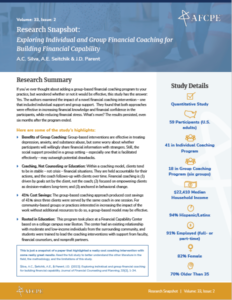
Exploring Individual and Group Financial Coaching for Building Financial Capability
Volume 33, Issue 2
A.C. Silva, A.E. Seitchik & J.D. Parent
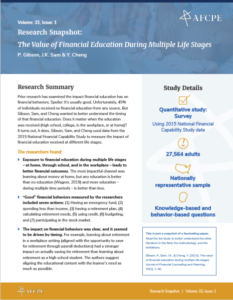
The Value of Financial Education During Multiple Life Stages
Volume 33, Issue 1
P. Gibson, J.K. Sam & Y. Cheng
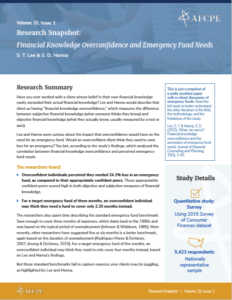
Financial Knowledge Overconfidence and Emergency Fund Needs
Volume 33, Issue 1
S.T. Lee & S. Hanna
Have you ever worked with a client whose belief in their own financial knowledge vastly exceeded their actual financial knowledge? Lee and Hanna would describe that client as having “financial knowledge overconfidence,” which measures the difference between subjective financial knowledge (what someone thinks they know) and objective financial knowledge (what they actually know, usually measured by a test or quiz).
Looking for more research to apply to practice?
Check out our #ResearchWednesday blog posts or the Research Briefs published quarterly in AFCPE’s newsletter, The Standard!

Comments are closed.
